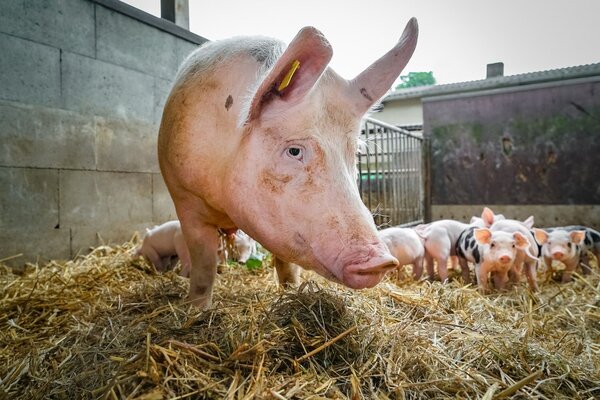Expertise
Export opportunities for German animal welfare meat
Inken Christoph-Schultz, Rebecca Derstappen, Cathleen Lehmann, Martin Banse | 04.04.2023
To what extent can meat from animals raised in Germany under higher animal welfare standards also be marketed abroad? The Thünen Institute has investigated this using poultry and pork as examples. The results are rather sobering.

Farm animal husbandry is the subject of public debate in Germany and also in other countries such as the Netherlands or Denmark. Demands for higher or improved animal welfare standards are becoming louder and louder. Livestock farms face major challenges, because higher animal welfare standards lead to higher production costs. Ultimately - in addition to possible accompanying measures such as premiums, tax relief, etc. - consumers would have to be prepared to pay higher prices for such meat at the shop counter.
Poultry and pig farming in particular attract much public criticism. Since Germany is closely involved in the international trade of pork and poultry meat, the question arises whether German meat, which has been produced to higher animal welfare standards, can be marketed internationally at a higher price. What demands do consumers in other regions of the world have of meat? These questions were investigated at the Thünen Institute in the project "ExPoTiWo – Perspectives of German animal welfare meat on export markets". The results are now available.
The focus of the investigations was poultry and pork. Based on statistical market data, Denmark, France, the Netherlands and the UK were examined as potential sales markets for poultry meat, while Japan, South Korea, Italy and Poland were selected for pork. At the start of the project in 2019, all these countries were important buyers of German poultry and pork.
While the issue of animal welfare plays virtually no role in the destination countries for pork in Japan, South Korea and Poland, there is a small group of consumers in Italy who are interested in it. In the countries studied for poultry meat exports, the situation is clearly different. In Denmark, France, the Netherlands and the UK, there is generally a basic knowledge of animal welfare. In these four countries there are established animal welfare labels, which show that animal welfare is already of great importance there. Nevertheless, in all eight countries considered, meat quality (colour, marbling, freshness, etc.), country of origin and price remain the most important purchasing criteria; the animal welfare aspect is of less importance.
Meat from Germany has a good reputation
Nevertheless: Even though domestic products are preferred in all countries surveyed because they are associated with freshness and better quality, meat from Germany enjoys a high reputation and is rated as very trustworthy. In addition, Germany is considered a reliable trading partner. According to this, consumers as well as stakeholders in the meat value chain in the study countries trust German labels and buy German meat if the quality and taste are particularly good - and the price for German meat is cheaper than for domestic ones. In the countries studied for poultry meat, better husbandry conditions (animal welfare) play an important role. Here, poultry meat from Germany would also have market opportunities with corresponding evidence of higher animal welfare standards. However, these standards would also have to be communicated to consumers through appropriate information, because meat produced under higher animal welfare standards is generally more expensive, and the labels that currently exist are not easy for many consumers to understand. In concrete terms, the individual criteria behind the animal welfare labels are not or only partially known to consumers at this point in time.
An important result of the project was that a potential target group for German animal welfare meat could be determined for each country under investigation. Depending on the country, the proportion of consumers who are interested in animal welfare and open-minded varies between 25% and 43%. In addition, there are also consumers in each country who are primarily interested in low prices and for whom animal welfare or the origin of the meat are unimportant. For poultry meat, this proportion is between 13% and 40%; for pork, between 31% and 45%. Another group (26 to 44%) has a strong preference for local products and is also interested in animal welfare.
In summary, the export potential for German meat is strongly influenced by country-specific and cultural conditions. At present, the export opportunities for German meat produced under higher animal welfare standards are rather low due to the high production costs. However, this does not have to remain the case in the long run, because in many European countries animal welfare labels for poultry meat are already well established and have captured a certain market share. The situation is different for pork: in the selected export countries, animal welfare currently plays a rather subordinate role, which makes the marketing of meat produced under higher animal welfare standards more difficult.
Quality should be promoted more intensively
Against this background, the greatest challenge for industry and politics is to communicate animal welfare in a more comprehensible and tangible way and, if necessary, to link it to quality aspects such as marbling or taste. In addition, the level of knowledge about animal welfare should be promoted. Information campaigns and good marketing strategies oriented to the respective target markets can be helpful here. Marketing animal welfare meat 'aus deutschen Landen' as a quality product is probably the greatest challenge here. In this context, it appears to be purposeful to integrate the aspect of animal welfare into the broader topic of quality and sustainability in order to achieve greater market opportunities. Currently, as the study results show, animal welfare meat can at best be exported as a niche or premium product.
In view of economic growth and a change in values in society, it is to be hoped that the issue of animal welfare will also gain importance in other countries in the future.








